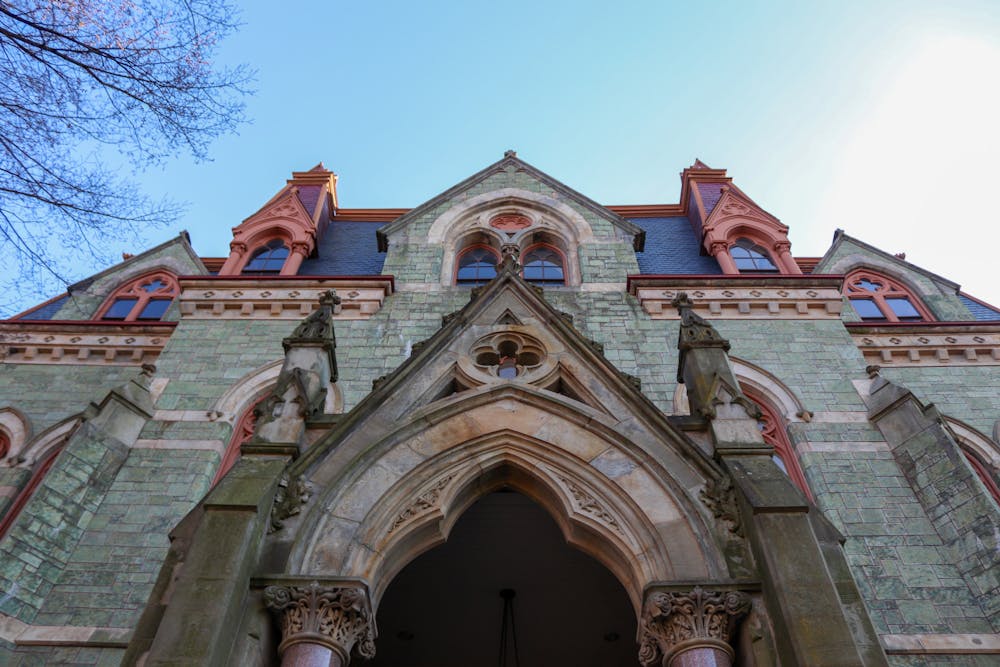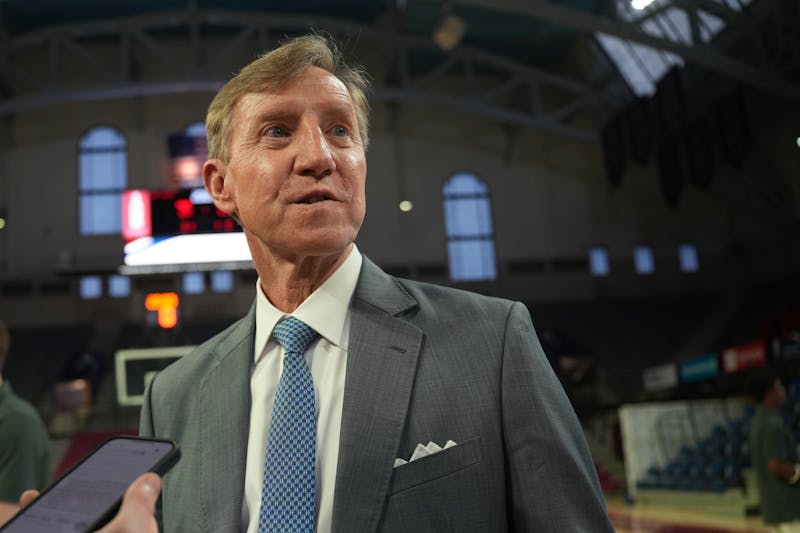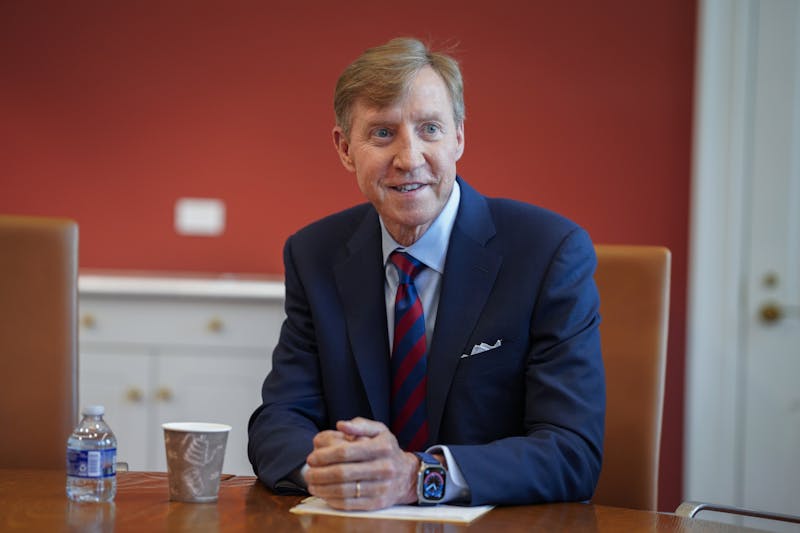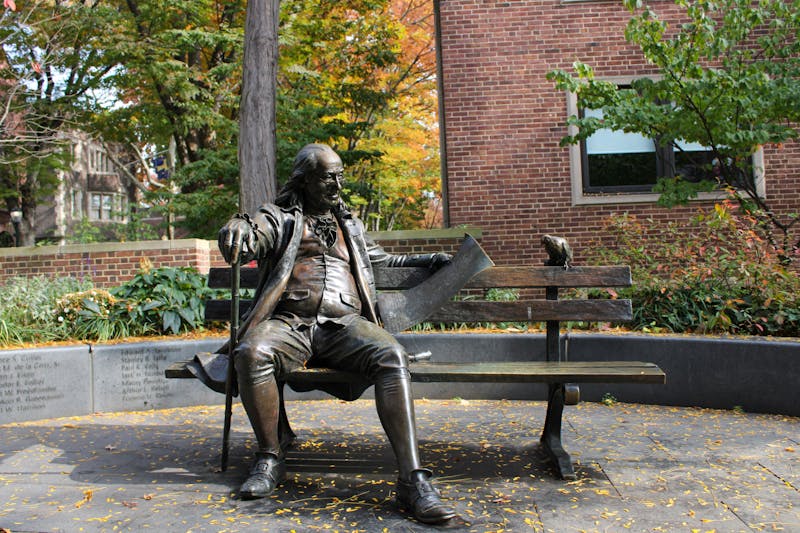
During an April 17 interview with The Daily Pennsylvanian, Penn President Larry Jameson cited the University’s institutional neutrality policy — which applies to local and global events that do not directly impact Penn — to explain the University’s relatively quiet stance amid federal attacks on higher education.
Across the Ivy League, many of Penn’s seven peer institutions also have policies of institutional neutrality, yet some have taken markedly different public stances in criticizing the administration under 1968 Wharton graduate and President Donald Trump. The DP compared Penn’s response — and Jameson’s rationale for it — to the other Ivy League universities’ institutional neutrality policies and actions.
A request for comment was left with a Penn spokesperson.
Penn’s policy — introduced in September 2024 — states that the University will “refrain from institutional statements … except for those which have direct and significant bearing on University functions.”
Penn community members have expressed support for the policy, which was designed to restrict commentary on controversial issues that do not directly relate to the University.
“We created a position probably a year ago of institutional restraint with our messaging,” Jameson told the DP. “The point of that which we articulate … is largely so that the institutional voice was not speaking out on behalf of the faculty and students and our stakeholders, but rather enabling them to develop their own positions and points of view.”
On April 22, Jameson co-signed a letter from the American Association of Colleges and Universities alongside 150 university presidents and higher education leaders from across the country, urging the federal government to protect and respect the autonomy of higher education institutions. The letter denounced the Trump administration’s “unprecedented government overreach” and “political interference” in higher education and vowed to “reject the coercive use of public research funding.”
Jameson’s previous communication about the impact of federal policies on the University included four messages to the Penn community. The first email, which was sent on Jan. 28, reasserted that the University’s “financial outlook is sound” and that the institution should “continue its essential research” as the Trump administration issued blanket freezes on federal funding and grants.
In February, Jameson highlighted that the University stands to lose $240 million from National Institutes of Health funding cuts — and reiterated Penn’s commitment to “identify solutions to minimize the impact” of the federal action.
A month later — just days after Trump froze $175 million of Penn’s federal funding on March 19 — Jameson wrote that the loss of research jeopardized by these cuts “will be felt by society and individuals far beyond our campus for years to come.” He added that students and faculty at the start of their research careers have expressed serious concerns.
When asked by the DP about calls from faculty and students for Penn to take a firmer stance against the Trump administration, Jameson said that “that’s a point of view that’s being expressed, and I’m listening to it and taking it into consideration.”
Other Ivy League institutions have been more vocal in criticizing the Trump administration despite also having institutional neutrality policies.
Harvard University’s policy of institutional neutrality states that university leaders may not make “official” statements about issues that do not affect the “core function” of the university.
On April 11, the Trump administration sent a list of demands to Harvard, including the elimination of diversity, equity, and inclusion initiatives and a reform of student disciplinary policies. In a letter on April 14, Harvard responded in a letter, stating that it was “not prepared to agree” to demands that exceeded the administration’s “lawful authority.” In response, the administration swiftly announced a freeze on $2.2 billion in multiyear grants to Harvard, prompting the university to file a lawsuit challenging the “unlawful” funding freeze.
Columbia University’s advisory committee on “institutional voice” is set to issue an official report with recommendations for the university’s institutional neutrality policy by the end of the academic year.
The Trump administration initially canceled $400 million in grants to Columbia on March 7, citing the school’s “continued inaction in the face of persistent harassment of Jewish students.” The university agreed to the administration’s demands on March 21. A week later, then-Interim Columbia President Katrina Armstrong, a 1998 Perelman School of Medicine graduate, resigned.
In April, Acting Columbia President Claire Shipman said the university will “reject heavy-handed orchestration from the government that could potentially damage our institution and undermine useful reforms” in a message that signaled a stronger response from the university.
Yale University — while not endorsing an official policy of institutional neutrality — advises leaders to “generally avoid” making statements that are not directly related to the university, asking them to use their “personal judgment.”
Yale has not issued an official statement regarding the actions of the Trump administration, but several members of the university’s faculty signed a letter challenging the administration’s respect for the “rule of law.”
Princeton University’s leaders have expressed a firm stance against institutional neutrality and established a less restrictive policy of “institutional restraint.”
Before the federal government issued demands to or funding cuts against the university, Princeton President Christopher Eisgruber criticized the Trump administration’s “attack” on Columbia in a piece for The Atlantic. Nearly $4 million for Princeton was frozen on April 10 following Eisgruber’s unwillingness to make concessions to the administration.
In August 2024, then-Interim Cornell President Michael Kotlikoff issued a statement outlining the university’s principles on free speech and institutional neutrality, emphasizing Cornell’s commitment to protecting individual rights to expression while ensuring such speech does not “violate the rights of others.”
The letter marked a formal adoption of institutional neutrality as a guiding administrative principle. In consideration of the “many and diverse views in the Cornell community,” Kotlikoff stated that Cornell’s leaders will “refrain” from issuing statements on events that do not directly impact the university.
In response to recent federal actions taken by the Trump administration, Cornell joined peer institutions in challenging regulations that threaten the university’s research funding. Cornell is part of a multi-institutional lawsuit against the Department of Energy over a proposed 15% cap on indirect cost recovery for federal research grants.
Brown University’s Public Statements Policy, which was created in 2022, states that the university can make official statements on matters of “direct impact” to the university or higher education.
In response to an announcement from the Trump administration that it would freeze $510 million in grants to Brown, Brown President Christina Paxson signed the joint letter from AAC&U denouncing the Trump administration’s recent federal actions. The university is also a named plaintiff in the federal lawsuit challenging the DOE.
Dartmouth College has a policy of “institutional restraint,” which limits communication from designated spokespersons to “provide space for diverse viewpoints.” Dartmouth’s president was the sole Ivy League leader to abstain from signing the April 22 letter against the Trump administration’s funding cuts. In an April 23 letter to the Dartmouth community, Dartmouth President Sian Beilock defended the decision, arguing that universities are not “political organizations.”
The Daily Pennsylvanian is an independent, student-run newspaper. Please consider making a donation to support the coverage that shapes the University. Your generosity ensures a future of strong journalism at Penn.
Donate











